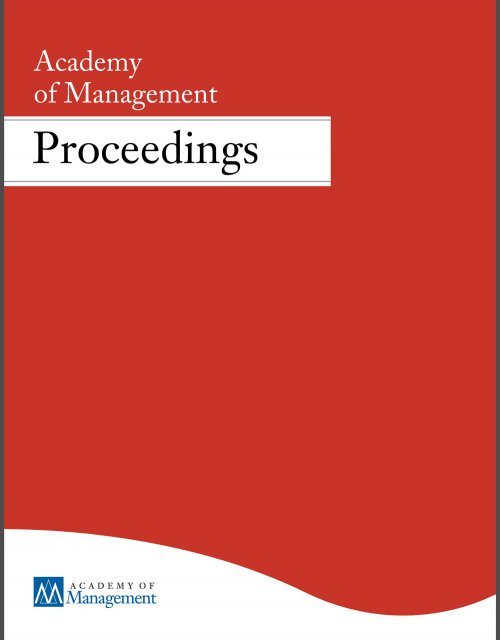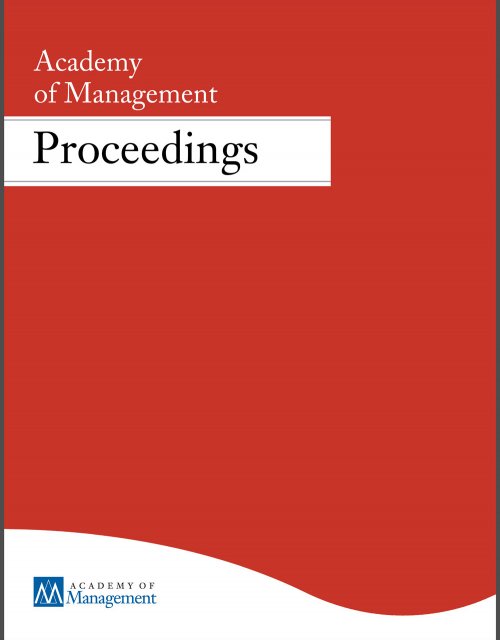Publication records
Subject(s)
Human resources management/organizational behavior
Keyword(s)
Error management, leadership
Errors are ubiquitous in organizations and may develop in catastrophes for the society at large. Leaders and top leaders are directly concerned as they are responsible for the errors of their organizations in addition to their own. Yet the role of leadership in handling organizational and managerial errors has been seldom explored. This panel will engage the audience with a series of insights: a) what may be expected from leaders in the management of errors; b) antecedents and outcomes of effective leadership behavior in error management; c) vivid examples of organizations where leadership issues are integrated in the management of organizational errors. The panel is composed of five scholars originating from as many countries. With expertise on industries - healthcare, aviation, nuclear energy - where errors may have severe consequences, it will propose an interactive debate that is relevant to both scholars and practitioners.
With permission of the Academy of Management
Volume
2015
ISSN (Online)
2151-6561
ISSN (Print)
0065-0668
Subject(s)
Human resources management/organizational behavior
Keyword(s)
Crisis management, mindfulness, resilience
It is time to rethink and reframe crisis management. The literature in this crucial domain of organizational research and practice is missing the mark. Whereas much of the research is focused on the large-scale crises that blindside companies, the reality in today’s business environment is quite different. True, some organizations experience large-scale crises to which they must respond. But, crises are relative to what organizations expect will not fail; almost all organizations experience much smaller-scale crises on a day-to-day basis. And while these events may not cost lives, they can affect market shares, legitimacy, careers, and livelihoods. If we take seriously the idea that the meaning of a crisis is contextual; then it is crucial to better understand how crises originate in the "crucible of the quotidian" (Taylor & Van Every, 1999), in the organization’s day-to-day recurring events. And it is equally important to understand the role that resilience can play as a possible critical "antidote." Reframing the crisis management literature around resilience encourages scholars to rethink crisis and consider a much broader domain of literature and empirical evidence. It also helps to more centrally situate the work and corresponding contributions in organization theory from the periphery where it has lingered for decades despite increasing attention in the business world. By bringing together an internationally recognized group of scholars who have studied crises big and small, this symposium will take a significant step in advancing knowledge and provoking new directions in crisis management research.
With permission of the Academy of Management
Volume
2015
ISSN (Online)
2151-6561
ISSN (Print)
0065-0668
Subject(s)
Marketing
Secondary Title
Fundamentals of business-to-business marketing
Edition
1st ed.,
Pages
1–75
ISBN
978-3-319-12462-9
ISBN (Online)
978-3-319-12463-6
Subject(s)
Economics, politics and business environment
Volume
6
Journal Pages
48–53
Subject(s)
Information technology and systems
Volume
Spezial
Journal Pages
107–112
Subject(s)
Economics, politics and business environment
Keyword(s)
Default options, charitable giving, online platforms,
field experiment
JEL Code(s)
C93, D03, D64
The updated versions are available at SSRN.
Subject(s)
Economics, politics and business environment
Keyword(s)
Price concentration study, mobile, wireless, merger control, efficiencies
Price concentration studies investigate the relationship between market concentration and price levels. They are increasingly used in the mobile telecom industry. This paper provides a detailed account of the limitations of such studies. In addition, it proposes a specific approach in order to account for quality differences across countries, which are likely important when explaining price differences. When applying our approach to European mobile telecom markets from 2003 to 2012, we find that there is no positive relationship between concentration and prices and some indications that the relationship may be negative.
View all ESMT Working Papers in the ESMT Working Paper Series here. ESMT Working Papers are also available via SSRN, RePEc, EconStor, and the German National Library (DNB).
Pages
28
ISSN (Print)
1866–3494
Subject(s)
Human resources management/organizational behavior
This paper focuses on women leaders’ self-views as women and leaders and explores consequences of positive social identity (i.e., positive evaluation of the social category in question) for women in leadership positions. We hypothesized that holding positive gender and leader identities reduced perceived conflict between women’s gender and leader identities and thereby resulted in favorable psychological and motivational consequences. Studies 1 and 2 revealed that positive gender identity indeed reduced women leaders’ identity conflict. In Study 3, we found that by lessening identity conflict, positive gender identity reduced stress, increased life satisfaction, and caused women to construe leading more as an attractive goal than a duty. In contrast, positive leader identity directly affected women’s motivation to lead, but did not reduce their identity conflict. Overall, these results emphasize the protective role of women’s positive gender identity for their advancement in organizations and leader identity development.
With permission of Elsevier
Volume
125
Journal Pages
204–219
Subject(s)
Marketing
Keyword(s)
Goals, product evaluation, positive mood
Negotiating the pursuit of multiple goals often requires making difficult trade-offs between goals. In these situations, consumers can benefit from using products that help them pursue several goals at the same time. But do consumers always prefer these multipurpose products? We propose that consumers’ incidental mood state alters perceptions of products in a multiple-goals context. Four studies demonstrate that being in a positive mood amplifies perceptions of differences between multiple conflicting goals. As a consequence, consumers are less likely to evaluate multipurpose products as being able to serve multiple distinct goals simultaneously. We conclude by discussing implications of these findings for marketers of multipurpose products.
View all ESMT Working Papers in the ESMT Working Paper Series here. ESMT Working Papers are also available via SSRN, RePEc, EconStor, and the German National Library (DNB).
Pages
28
ISSN (Print)
1866–3494

